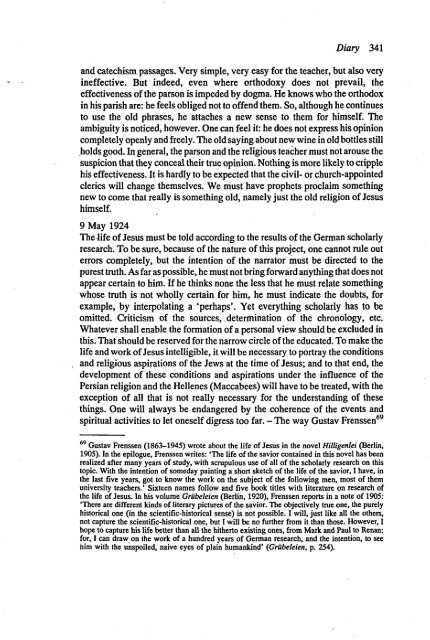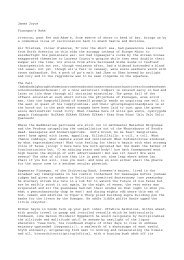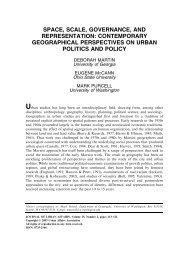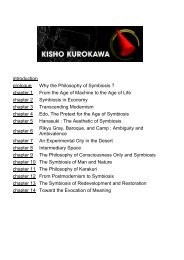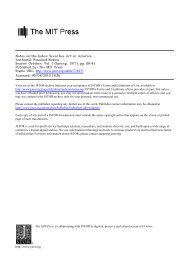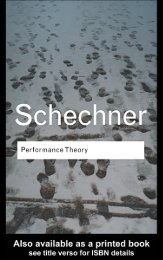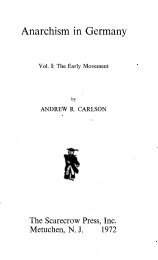Diary: Written by professor Dr Gottlob Frege in the ... - AAAARG.ORG
Diary: Written by professor Dr Gottlob Frege in the ... - AAAARG.ORG
Diary: Written by professor Dr Gottlob Frege in the ... - AAAARG.ORG
You also want an ePaper? Increase the reach of your titles
YUMPU automatically turns print PDFs into web optimized ePapers that Google loves.
<strong>Diary</strong> 341<br />
and catechism passages. Very simple, very easy for <strong>the</strong> teacher, but also very<br />
<strong>in</strong>effective. But <strong>in</strong>deed, even where orthodoxy does not prevail, <strong>the</strong><br />
effectiveness of <strong>the</strong> parson is impeded <strong>by</strong> dogma. He knows who <strong>the</strong> orthodox<br />
<strong>in</strong> his parish are: he feels obliged not to offend <strong>the</strong>m. So, although he cont<strong>in</strong>ues<br />
to use <strong>the</strong> old phrases, he attaches a new sense to <strong>the</strong>m for himself. The<br />
ambiguity is noticed, however. One can feel it: he does not express his op<strong>in</strong>ion<br />
completely openly and freely. The old say<strong>in</strong>g about new w<strong>in</strong>e <strong>in</strong> old bottles still<br />
holds good. In general, <strong>the</strong> parson and <strong>the</strong> religious teacher must not arouse <strong>the</strong><br />
suspicion that <strong>the</strong>y conceal <strong>the</strong>ir true op<strong>in</strong>ion. Noth<strong>in</strong>g is more likely to cripple<br />
his effectiveness. It is hardly to be expected that <strong>the</strong> civil- or church-appo<strong>in</strong>ted<br />
clerics will change <strong>the</strong>mselves. We must have prophets proclaim someth<strong>in</strong>g<br />
new to come that really is someth<strong>in</strong>g old, namely just <strong>the</strong> old religion of Jesus<br />
himself.<br />
9 May 1924<br />
The life of Jesus must be told accord<strong>in</strong>g to <strong>the</strong> results of <strong>the</strong> German scholarly<br />
research. To be sure, because of <strong>the</strong> nature of this project, one cannot rule out<br />
errors completely, but <strong>the</strong> <strong>in</strong>tention of <strong>the</strong> narrator must be directed to <strong>the</strong><br />
purest truth. As far as possible, he must not br<strong>in</strong>g forward anyth<strong>in</strong>g that does not<br />
appear certa<strong>in</strong> to him. If he th<strong>in</strong>ks none <strong>the</strong> less that he must relate someth<strong>in</strong>g<br />
whose truth is not wholly certa<strong>in</strong> for him, he must <strong>in</strong>dicate <strong>the</strong> doubts, for<br />
example, <strong>by</strong> <strong>in</strong>terpolat<strong>in</strong>g a 'perhaps'. Yet everyth<strong>in</strong>g scholarly has to be<br />
omitted. Criticism of <strong>the</strong> sources, determ<strong>in</strong>ation of <strong>the</strong> chronology, etc.<br />
Whatever shall enable <strong>the</strong> formation of a personal view should be excluded <strong>in</strong><br />
this. That should be reserved for <strong>the</strong> narrow circle of <strong>the</strong> educated. To make <strong>the</strong><br />
life and work of Jesus <strong>in</strong>telligible, it will be necessary to portray <strong>the</strong> conditions<br />
and religious aspirations of <strong>the</strong> Jews at <strong>the</strong> time of Jesus; and to that end, <strong>the</strong><br />
development of <strong>the</strong>se conditions and aspirations under <strong>the</strong> <strong>in</strong>fluence of <strong>the</strong><br />
Persian religion and <strong>the</strong> Hellenes (Maccabees) will have to be treated, with <strong>the</strong><br />
exception of all that is not really necessary for <strong>the</strong> understand<strong>in</strong>g of <strong>the</strong>se<br />
th<strong>in</strong>gs. One will always be endangered <strong>by</strong> <strong>the</strong> coherence of <strong>the</strong> events and<br />
spiritual activities to let oneself digress too far. - The way Gustav Frenssen 69<br />
69 Gustav Frenssen (1863-1945) wrote about <strong>the</strong> life of Jesus <strong>in</strong> <strong>the</strong> novel Hilligenlei (Berl<strong>in</strong>,<br />
1905). In <strong>the</strong> epilogue, Frenssen writes: 'The life of <strong>the</strong> savior conta<strong>in</strong>ed <strong>in</strong> this novel has been<br />
realized after many years of study, with scrupulous use of all of <strong>the</strong> scholarly research on this<br />
topic. With <strong>the</strong> <strong>in</strong>tention of someday pa<strong>in</strong>t<strong>in</strong>g a short sketch of <strong>the</strong> life of <strong>the</strong> savior, I have, <strong>in</strong><br />
<strong>the</strong> last five years, got to know <strong>the</strong> work on <strong>the</strong> subject of <strong>the</strong> follow<strong>in</strong>g men, most of <strong>the</strong>m<br />
university teachers.' Sixteen names follow and five book titles with literature on research of<br />
<strong>the</strong> life of Jesus. In his volume Grübeleien (Berl<strong>in</strong>, 1920), Frenssen reports <strong>in</strong> a note of 1905:<br />
'There are different k<strong>in</strong>ds of literary pictures of <strong>the</strong> savior. The objectively true one, <strong>the</strong> purely<br />
historical one (<strong>in</strong> <strong>the</strong> scientific-historical sense) is not possible. I will, just like all <strong>the</strong> o<strong>the</strong>rs,<br />
not capture <strong>the</strong> scientific-historical one, but I will be no fur<strong>the</strong>r from it than those. However, I<br />
hope to capture his life better than all <strong>the</strong> hi<strong>the</strong>rto exist<strong>in</strong>g ones, from Mark and Paul to Renan:<br />
for, I can draw on <strong>the</strong> work of a hundred years of German research, and <strong>the</strong> <strong>in</strong>tention, to see<br />
him with <strong>the</strong> unspoiled, naive eyes of pla<strong>in</strong> humank<strong>in</strong>d' (Grübeleien, p. 254).


